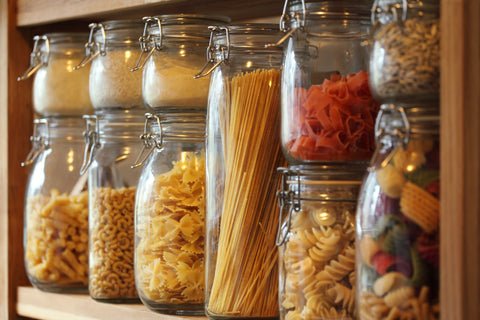Pasta is one of the world’s favorite foods. Learn how to store boxed dry and fresh pasta
Live long and prosper, pasta!
If stored properly and carefully, dry pasta can stay fresh for up to one year. Let’s learn how to store dry or fresh pasta.
Boxed Dry Pasta
This kind of pasta can be stored someplace cool and dry. You could store your pasta in your pantry, for example. Be sure to avoid the refrigerator. You don't want your dry pasta to absorb humidity because it will ruin it. A secret is also using an air-tight box or container. Dry pasta keeps very well if you store it carefully, of course. It could “survive” in good conditions for more than one year. This is not applicable for egg pasta or fresh pasta. In this case it is crucial to pay attention to the expiration date. As you could imagine, filled pastas like tortellini or ravioli have a shorter life span. They should be rigorously kept in the fridge.
Cooked Pasta
When you have leftover cooked pasta, store it in the fridge, using freezer-safe containers. You can definitely store cooked pasta in this manner. Don't leave it in the fridge for too long, however. We recommend that you consume it within 3 or 4 days, no more. It is best to play it safe when it comes to already cooked and seasoned foods. You can never take too many precautions!
Pasta Sauce
You can store your sealed jars of sauce at room temperature, but you can also keep it in the fridge. If your jar is open, we recommend storing it tightly sealed in the fridge for up to four days to prevent it from going bad.
Frozen cooked pasta
Freezing pasta can be useful not only if you have leftovers from the day before but also if you want to prepare your meals in advance. Now the purists of Italian yellow gold will shudder with contempt, but we are ready to take the risk anyway! Ok, it's not ideal...but what can we do about it? We live in a world where time is a luxury! But care must be taken. Here are our tips: If you want to pre-cook and freeze your pasta, remember not to cook it all the way through. The golden rule - you know it by now - is "al dente", tender but still firm. Well, in this case do not follow the rule, but remove the pasta from the heat slightly before it is “al dente.” This is because you will reheat it in sauce and will cook it to your ideal texture. Wait for the pasta to cool and freeze it using zip-top bags or freezable containers. Want a chef's trick? After you've cooked and drained your pasta, add some extra virgin olive oil. Don't overdo it, just a little is enough! The oil will allow your pasta to keep even better. Give it a try! The result is guaranteed.



